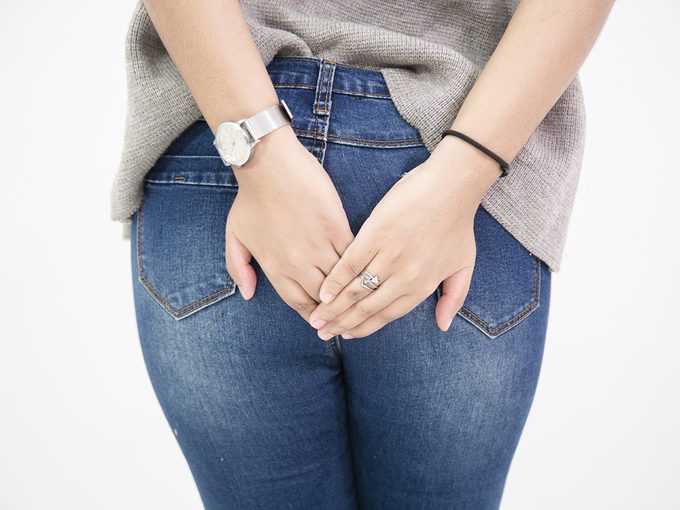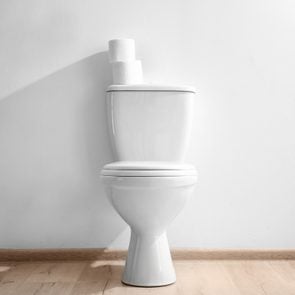What Happens to Your Body When You Hold in a Fart
Holding in flatulence may be more socially acceptable than letting it go, but it can lead to bloating, pain, and, in some cases, serious health conditions.
Holding in farts
A man went to his girlfriend’s house to have dinner and meet her mother for the first time. Unfortunately, the food didn’t agree with him, and he felt gas welling in his stomach. Not wanting to offend a potential mother-in-law, he held the fart in—and died the next day due to complications of the retained gas. At least that’s how the viral story goes. But like many strange tales on the Internet, this one is likely false, says to fact-checking site Snopes.
People generally don’t die just from holding in a fart, even if it’s a big one, says gastroenterologist Niket Sonpal, MD, an internist and faculty member at Touro College of Medicine in New York City. That’s not to say you won’t experience some ill effects from trying to keep your gaseous emissions in. And you don’t want to make it a habit, he says.
Why farts happen
Flatus, the official name for farts, happens when gases in the intestine are released through the rectum, a process that can range from characteristically loud to infamously “silent but deadly.” Farting is generally painless and often provides a sense of relief.
There are several ways gas ends up in your intestine. The most common type, called endogenous gas, is a byproduct of the digestion process. Food travels to the large intestine, where bacteria ferments it, producing gas.
Gas is sometimes produced when stomach acid interacts with food in the small intestine. Some foods produce more gas during the digestion process than others. Beans are known culprits, but other foods that can cause gas are high-fibre foods like broccoli and prunes, sulfurous foods like onions, sugar-free foods containing sugar alcohols, and inflammatory foods like dairy and gluten, says Trista Best, a registered dietitian at the Whitfield County Health Department in Dalton, Georgia.
Certain behaviours can contribute to gas, like eating too quickly, says Best, who is also a consultant with Balance One Supplements. You can also trap gas in your intestines through swallowing air—usually by breathing through your mouth, drinking soda, smoking, or chewing gum, says Dr. Sonpal. (Find out more surprising things your farts can reveal about your health.)
Regardless of the source, when there is too much gas in the colon, it puts pressure on the colon wall and triggers the flatus reflex.
Normal farts contain a mixture of nitrogen, hydrogen, methane, and carbon dioxide gases. Depending on the food you ate and the type of bacteria in your gut, they may contain other gases, including sulfur, which gives them that “rotten egg” smell that can really clear a room.
Everyone farts
While some people brag about never farting, the truth is that everyone does it—and there’s a wide range of what’s considered normal and healthy. The average person produces about 705 millilitres, or 24 ounces, of gas in 24 hours. But the amount can range from 476 millilitres (16 ounces) to 1,490 millilitres (50 ounces), according to a study published in Gut.
To determine these numbers, scientists recruited 10 healthy adults and had them eat half of a can of beans in addition to their regular diet. Over the next day, they measured their gas using a rectal catheter (which was likely as pleasant as it sounds—the things people do for science).
They found that men and women both farted about eight times a day, although passing gas up to 20 times a day is normal. Large farts were most common in the hour after meals, and the subjects released half as much gas while sleeping as they did while awake.
Some illnesses can make you pass gas more than normal. Health conditions such as irritable bowel syndrome, lactose intolerance, food poisoning, celiac disease, and gastroesophageal disease all have increased gas as a common symptom, says Dr. Sonpal. If you feel like you are farting more than usual and have other symptoms, like pain, diarrhea, constipation, or a fever, you might want to speak with your doctor. (Here are 20 symptoms you should never ignore.)
What happens when you hold in a fart?
So what do you do if you are in a situation like, oh, meeting a future in-law or giving a presentation in an important meeting and you don’t want to let a fart fly? Thankfully, the rectum is a sphincter, and you can override the urge to pass gas and hold it in indefinitely.
How long you can hold it varies from person to person and day to day. “It’s tough to say how long you can hold in a fart since that depends on several factors, including what foods you are eating, hormonal activity, and medical conditions,” says Dr. Sonpal.

Problems with holding it in
Holding it in keeps the gases trapped in your intestines, where they will continue to build up and put pressure on the colon wall until you find a way to release them.
“Holding your gas usually won’t lead to adverse health effects or damage,” says Dr. Sonpal. “However, it is better to release your farts than hold them in.”
Here are some of the downsides:
Pain
Perhaps the most common side effect of holding a fart in is that the increased pressure in your gut can become painful. It can range from a dull ache to sharp, stabbing pains.
Bloating
Bloating occurs when gases are trapped inside your intestines, distending your belly. Not only can it make you look several months pregnant (regardless of gender), but it also can make you feel uncomfortable in your clothing and self-conscious.
Mouth farts
Sometimes it seems as if a fart just disappears on its own. This is because your body can reabsorb the gases, at least temporarily. But they will find a way out, if not through flatulence then through belching or being exhaled in your breath, according to a study published in Digestive Diseases and Sciences. Yes, you read that right: your farts can come out through your mouth.
Diverticulitis
A repeated habit of holding in gas could possibly lead to diverticulitis, a debilitating condition where pouches in the digestive tract, usually in the colon, become infected. The result: pain, vomiting, constipation, or abdominal tenderness, says Dr. Sonpal.
How to fart less
The best thing to do when you need to pass gas is to simply pass the gas. It may be noisy and/or smelly, but it is one of those bodily functions that should be normalized. You can’t eliminate flatus, but if you want to reduce the number of farts you produce, there are some things you can try:
Do an elimination diet
The first step to reducing your gas is to figure out what is causing it, says Best. Doing an elimination diet—totally eliminating common gas-causing foods from your diet for several weeks—can help you pinpoint which foods are the problem. Start by eliminating garlic, artichokes, apples, mangoes, prunes, cauliflower, and most gluten-containing products, she says. (Find out the sneaky things that can trigger IBS symptoms.)
Avoid trigger foods
Once you’ve identified the foods that cause you gas, make a plan to eat them less often or avoid them entirely.
Pop a supplement
Sometimes people become extra gassy because they lack the right bacteria or enzymes to digest their food completely, says Best. Taking a probiotic and/or digestive enzymes supplement may provide some relief.
Skip the gum and cigarettes
Anything that requires you to open your mouth repeatedly, like chewing gum and smoking, can cause you to swallow air, leading to increased gas.
Nix carbonated beverages
Some people find that drinking bubbly beverages causes their tummy to bubble. If that’s you, stick to drinks without carbonation. It’ll help reduce the gas in your stomach.
Eat smaller meals
Large, heavy meals can lead to an increased amount of gas being made at one time. Eating smaller meals throughout the day spreads out the digestive process and the gases produced.
Eat slowly
Inhaling your meal causes you to swallow air. The fix: eat slowly and mindfully, says Best.
Go for a walk after a meal
Exercise is known to help speed digestion and keep things moving through your intestines, says Best. Taking an after-dinner walk may help reduce gas and bloating, and it also gives you an opportunity to release it unobtrusively outdoors. (Here’s what happens when you start walking 10,000 steps a day.)
Do this yoga pose
There is a specific yoga posture called Pawanmuktasana or “wind releasing pose” that is designed to help you expel gas. Doing this before going somewhere public may help get the farts out of your system in private. Lie on your back, lift your legs, bend your knees and bring them towards your chest. Applying gentle pressure in this position may help release some gas.
Next, find out the sneaky reasons you’re always bloated.






